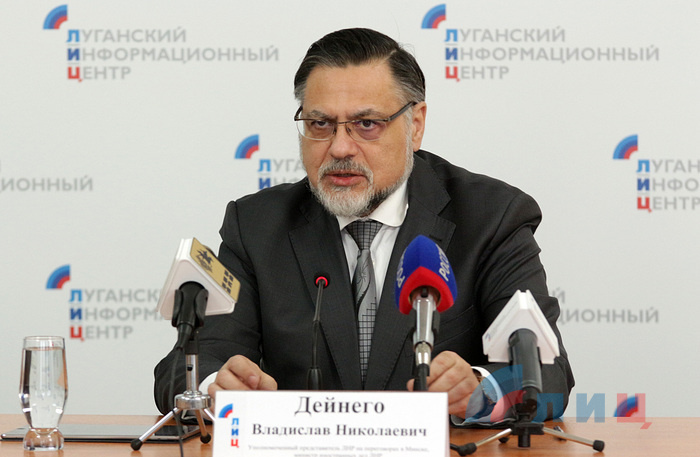
Kiev derails security subgroup emergency session - Deinego
Military&DefenceUkrainian representatives have derailed the emergency session of the Contact Group working group on security issues requested by the Lugansk People’s Republic, LPR representative at the Minsk talks, the Republic’s Foreign Minister Vladislav Deinego said.
“Ukraine has detailed the security subgroup’s session,” Deinego said. “At 12:23, (coordinator of the Contact Group security subgroup for OSCE), Mr Yasar Halit Cevic sent the following notification cancelling the previously agreed emergency session: “At 11:06, East European Summer Time, Ukrainian representative (in the working group on security issues), Mr (Alexander) Polischuk phoned the coordinator to state that the Ukrainian delegation had not consented to holding an extraordinary session of the working group on Tuesday. Due to a lack of consensus, the unscheduled consultations of the working group on security issues will not take place today.”
It is noteworthy that at around 10:50, all the participants of the working group had confirmed their readiness to join the consultations at the extraordinary emergency session from 13:00 to 15:00 on Tuesday. Thus, Ukrainian not only avoids the discussion of acute settlement issues but also behaves in an unprincipled way, showing distinct contempt to other parties to the talks. However, regardless of Ukraine’s dodging the dialogue, it will have to answer the question regarding the capture of our observer at the JCCC,” Dienego said.
The session derailed by Ukraine on Tuesday had been initiated by the LPR in connection with the abduction by Kiev forces of representative of the LPR Office at the JCCC Andrey Kosyak.
A Ukrainian army special operations group captured Andrey Kosyak in the Zolotoye security zone on October 13. After Kiev failed to immediately return the observer as the LPR demanded, LPR Head Leonid Pasechnik said that further dialogue with Kiev within the Minsk format made no sense until Ukraine had returned Kosyak. The LPR Office at the JCCC stopped contacts with Ukraine and limited a number of movement routes for OSCE monitors. Deputy chief monitor of the OSCE Special Monitoring Mission Mark Etherington promised to thoroughly examine the circumstances behind the capture of the LPR officer by Ukrainian forces.
The Ukrainian government launched the so-called anti-terrorist operation against Donbass in April 2014. Conflict settlement relies on the Package of Measures for the Implementation of the Minsk Agreements, signed on February 12, 2015 in the Belarussian capital by the Contact Group members and coordinated by the Normandy Four heads of states (Russia, Germany, France and Ukraine). The UN Security Council approved the document by Resolution No 2202 of February 17, 2015 and called upon the parties to ensure its implementation.
The document provides for comprehensive ceasefire, withdrawal of all heavy weapons from the contact line, starting a dialog on reconstruction of social and economic ties between Kiev and Donbass. It also envisages carrying out constitutional reform in Ukraine providing for decentralization and adopting permanent legislation on a special status of certain areas of the Donetsk and Lugansk regions.
To facilitate the work of the Contact Group, four working groups were set up under its aegis to deal with issues of security, politics, return of internally displaced people and refuges, as well as with social, humanitarian, economic and rehabilitation issues. *i*s



